Why Vaccines and Immunizations Matter – Don’t Forget History
Those who forget history are doomed to repeat it. Most of us have not had personal experience with illnesses like measles, mumps, German measles, or polio. Thank goodness for that. It is because a generation ago individuals, families, and doctors choose a different path. They witnessed loved ones stricken with these diseases. When the opportunity arose to protect themselves from these viruses in the form of vaccinations, they took them.
Before the measles vaccine, annually there were about 450,000 cases of measles. About 450 people died. Imagine having a loved one die of measles. Since the licensing of the vaccine in 1963, the number of cases has dropped by 98 percent! Today small outbreaks still occur primarily in communities that declined the measles vaccine, among high school and college students who were inadequately immunized, or among travelers visiting countries, typically developing countries, where the illness is still common.
Protecting the country from measles is only one example of vaccine success. In 1950, there was an effort to rid the world of another illness, known as smallpox, through systematic vaccinations. This effort was later undertaken by the World Health Assembly. By 1977, the last case of smallpox was seen. By 1980, the World Health Organization reported that smallpox was gone and completely eradicated. As a result, routine vaccination was no longer necessary. Another example of how a successful vaccination program can reduce or even eliminate an otherwise harmful or fatal disease.
Vaccines today allow children not to develop hepatitis B, which affects the liver, or varicella, also known as chickenpox. Future generations of women will decrease their risk of developing cervical cancer and genital warts with a vaccine to protect against a variety of human papilloma viruses. Vaccines can decrease the chance of missing work or becoming ill, decrease the likelihood you will die from influenza or pneumonia, and may prevent you from contracting a bacteria, like pneumococcus, that is resistant to antibiotics. The risk of developing an extremely painful and at times disability skin condition called shingles falls with immunization of older adults.
Vaccines can prevent many deadly illnesses, yet unfortunately, adults aren’t getting them. In 2010, an outbreak of pertussis, whooping cough, resulted in the deaths of ten babies as well as a statewide outbreak in California with 7800 cases.[i] This outbreak was felt to be due to adult immunization rates of only fifty percent. With a low immunization rate when the illness occurred, it spread from unimmunized adults to unsuspecting children. The results were deadly. The 2010 outbreak was the worst outbreak since 1955. To prevent another outbreak from occurring, California state legislators mandated that all children from 7th to 12th grade starting in July 2011 must demonstrate that they have had a recent vaccination for pertussis.
Sadly, adults are not the only ones not getting vaccinated. A 2010 report by the National Committee for Quality Assurance found a troubling and disturbing trend. Children enrolled in commercial health insurance plans, private insurance, had decreasing vaccination rates compared to those public insurance plans like Medicaid. Due to opinions of celebrities about the false link between autism and vaccinations, parents in the former group were delaying or avoiding vaccinations. There is no link. In 2011, the original research study that had hinted a link between autism and vaccinations was labeled as completely fraudulent. Unfortunately, the damage has already been done. The report noted that:
“If this downward trend in vaccination rates in commercial plans persists, an unusual phenomenon may occur. The comparatively well-educated or “high-information” members more typical of commercial plans may endanger their children’s health—and the public’s health—because of their greater access to and overvaluing of misinformation. Medicaid patients may become healthier.”
The pertussis outbreak and reluctance of patients to immunize children demonstrates a potential problem. Although children today no longer worry about polio, measles, and smallpox because the number of cases has disappeared due to immunization efforts, the is a growing trend of people not believing in the power of a vaccine. Be informed of the risks and benefits and then make a thoughtful decision for yourself and your loved ones. Think for yourself.
Start with dispelling some myths. The topic of the next post.
The Truth: Vaccine and Immunization Myths, Busted!
The Truth About The Flu Vaccine – A Tale of Two Patients
What iPhone 6 Bendgate Can Teach Us About the Vaccination Debate
[i] http://www.sacbee.com/2010/12/29/3287642/new-law-requires-whooping-cough.html#ixzz19XxSxen7, accessed May 11, 2011.
 Get important exclusive advice and tips on how to save money while staying healthy.
Get important exclusive advice and tips on how to save money while staying healthy. Learn how to make intelligent choices in America's Healthcare System.
Learn how to make intelligent choices in America's Healthcare System.
Thank you for all this great information about vaccines. One thing that really stood out to me is that you say that they prevent illness. It would be nice to know that you won’t have to worry about your kids getting sick.